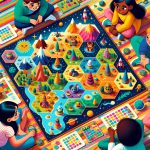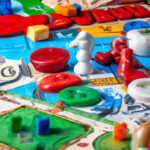Introduction
Autism-friendly board games provide a fun yet safe experience for children and adults on the Autism spectrum. These board games, designed with the specific needs of persons living with autism in mind, can help foster social interaction in a way that feels comfortable and rewarding. By removing some of the pressure felt by individuals when playing traditional board games, autistic persons often feel more at ease and able to join in with playtime activities.
These autism-friendly board games are tailored to meet the sensory, motor and cognitive needs of those living with Autism. Many feature additional visual cues or game pieces that help aid understanding and make the game more manageable for the participant. They may also be designed take into consideration important issues such as noise levels, which can help set a less intrusive yet still stimulating atmosphere.
As well as providing fun interactions during playtime sessions, tests have shown autism friendly board games helped increase self-esteem and confidence among players. Such an advantage can produce long lasting positive effects throughout someone’s life if nurtured correctly. Playing in enjoyable settings helps autistic children learn important skills such as following directions, taking turns, socializing, communication and problem solving; all great life lessons to have once they are ready to enter adult society. Not only do these skills assist those on the Autism spectrum directly but they can also provide them with an outlet to share their enthusiasm toward something they enjoy which invites positive attention from family members and peer groups; allowing autistic individuals further opportunities to express themselves socially while participating in something mutually enjoyable for everyone involved.
Benefits of Autism Friendly Board Games
Autism friendly board games offer numerous benefits for those living with autism. Firstly, board games have been proven to be an excellent form of physical stimulation. The simple act of moving pieces across a board provides plenty of practice in fine motor skills and hand-eye coordination ” these skills are important in daily activities such as writing, schoolwork and eating. Furthermore, the use of symbols, numbers and colours featured throughout most board games provide much needed cognitive stimulation for those on the spectrum.
Beyond physical and cognitive stimulation, working together to complete a game is also a great way to strengthen social interaction skills. Players must use communication skills such as eye contact, taking turns and responding appropriately when it’s their turn. Along with helping to further develop existing social interaction skills, starting a game is a low pressure approach to building friendships among players. As board games usually require patience from all players involved, this might just help encourage a greater understanding between players of appropriate social boundaries; something which is often difficult for autistic people to learn or understand.
Kid-Friendly or Adult/Family Friendly Autism Friendly Board Games
Board games offer an incredibly diverse range of entertainment that anyone can enjoy, but certain mechanics or topics can be difficult for those on the autism spectrum. With this in mind, many companies and designers have created autism friendly board games specifically suited to people of all ages. These games are especially helpful for those who wish to engage in game night with family or friends but may not feel comfortable joining a regular game due to any anxieties associated with autism.
Kid-Friendly Autism Board Games: When choosing a kid-friendly autism board game, look for one that has simple and intuitive mechanics as well as bright colors and cute characters. Other features to consider are cooperative play options so everyone at the table can work together and themes that offer educational opportunities without feeling too textbookish. Additionally, it is important to make sure the game does not have too many bells and whistles – over-stimulation for kids on the spectrum can be an issue with overwhelming experiences leading to meltdowns or shutdowns. In terms of cost, there are plenty of high quality affordable options available for purchase no matter your budget.
Adult/Family Friendly Autism Board Games: The criteria for selecting an adult/family friendly autism board game is similar but requires additional considerations towards more complex strategies along with longer playtime duration. When choosing a game you’ll want something that offers interesting tactics while keeping some personal relevance – like it being relatable to their everyday experiences or hobbies ” so they don’t become easily bored or overwhelmed. Most importantly, look for game mechanics that feature several different levels of difficulty; this type of flexible challenge profile allows the players themselves to dictate how the game will turn out – giving everyone an enjoyable experience regardless if someone’s playing at their own pace or someone else’s speedier rate.
Popular Autism Friendly Board Games
Playing board games with children on the autism spectrum can be a challenging but fulfilling experience. Certain games can offer help with developing skills such as communicating, strategy-building, exercising social patience and understanding rules. Board games can also be used to help children learn about emotions, coping skills and self-esteem.
Popular board games for autistic children are typically adapted versions of traditional family favorites such as Connect Four, Jenga and LEGO building blocks. Other popular titles include the classic Bingo game, Guess Who? and Memory Match Challenge. Each of these games offers their own unique benefits when teaching developmental skills to those on the autism spectrum.
Connect Four is an excellent game to teach problem-solving strategies while reinforcing counting skills. It requires two players and each player attempts to connect four pieces of their color in a row either horizontally, vertically or diagonally to win the game. Many adaptations exist including different colors and various sizes of game boards which make this particular title great for any age range with different levels of skill or intellect.
Jenga likewise offers a simple stacking strategy built on tactile dexterity for those who are both visual and tactile learners. Players must carefully pull pieces from a tower stack without knocking it over until one player successfully clears all pieces from the table before anyone else does and claims victory!
LEGO building blocks contain potentially unlimited combinations for autistic children that might require additional guidance due to processing issues but enjoys experimenting with create structures of their own design. This flexibility allows players to explore mathematical concepts associated with fractions as well as angles by engineering buildings with pre-formed bricks or by creating new designs completely from scratch!
Bingo is another great game perfect for beginners who are just getting familiar with rules since players must have basic deductive reasoning skills in order to align corresponding images across multiple cards – hence identifying specific patterns needed to win the game! The key benefit here is that players may practice communication between competing groups when working together during playtime (e.g., calling out numbers loudly so other participants hear them).
Finally, Guess Who? teaches one important concept: facial recognition – something that can often be difficult for autistic children due to sensory processing issues or feelings of confusion when trying to interpret expressions closest relatives all too closely mimic (i.e., siblings). This simplified guessing game seeks to expose underlying intricacies found in facial features without becoming too overwhelming thanks its biomorphic caricatures which mimic real-world people yet maintain a certain playful aesthetic quality about them at all times! Again, allowing answers between competing groups might help boost confidence in multilayered communication strategies within playtime sessions (i.e., verbal/nonverbal interactions). Likewise, Memory Match Challenge practices similar skills but integrates family favorite card matching experiences into it instead ” shuffling up tiles before playing again makes sure no two experiences will ever feel identical during gameplay making each session personalized depending upon player’s individual needs/desires!
Quality and Suitability of Autism Friendly Board Games
Finding the perfect board game for users who have autism can be tricky, as it is important to consider not just the age appropriateness of the players but also its theme, durability, and user reviews. Age-appropriateness cannot be overstated when considering an autism friendly board game ” both because children with autism may require extra support or practice to enjoy and engage with a game, as well as to ensure they do not become frustrated or overwhelmed by an overly complicated game. The chosen board games theme should have upbeat visuals, clear instructions and constraints (i.e., setting limits between turns etc.), safe images that do not contain any violence or inappropriate content and evoke casual conversations or verbal exchanges. Durability of the game made from either card stock (heavier quality paper) or something even more solid like actual boards and pieces can mean repeated use for years ” this will maximize your investment! Finally, reading customer reviews before purchase is also paramount in finding a suitable board game; customer reviews should have positive ratings from both parents and professionals in the autism community themselves.
Cost Considerations for Autism Friendly Board Games
The term “autism friendly board games” typically refers to a variety of board games designed to be both engaging and accommodating for those on the autism spectrum. Prices for these games can range from simply a few dollars to quite expensive. When deciding what game to purchase, budget must be taken into account.
At the entry-level end, there are extremely inexpensive autism friendly board games such as “Let’s Go Fishin’!” The game pieces in this game are colorful and easy to manipulate, while the determined goal is straightforward and simple, promoting positive reinforcement. Another great beginner game is “Monopoly Junior Theme Park Adventure.” It has adjustable rules which allow players to complete challenges at their own pace rather than being pushed by a strict timeline or amount of turns. For slightly more money, Settlers of Catan Junior allows autistic players to create an island together using resources found on dice rolls, providing enjoyable risk and reward challenges without penalizing losing players excessively. Twisted Fish is another popular autism friendly boardgame where players race against each other through ever changing aquatic paths or upriver against the current. For this game, complex strategies with blindsiding tactics are also encouraged adding further enjoyment for seasoned players looking for something challenging as well.
For those on a much larger budget there are also slightly pricier options such as Pandemic Legacy: Season 1 . This cooperative strategy game highlights long term consequences such as strategic management and understanding choices within context; proving invaluable lessons learned throughout different scenarios that occur in each new twist of play each month – giving comfort they won’t experience confusion while attempting comedic victories along the way; a perfect balance between skill refinement and fun performance!
Conclusion
Autism friendly board games help autistic persons feel more included in game playing experiences. These board games provide children on the autism spectrum with activities that are highly engaging and non-verbal. Autism friendly board games have been specifically designed to meet the special needs of individuals with autism and offer an outlet for their creativity and passions. They can open up communication opportunities, help enhance motor skills, and focus attention. With a variety of engaging questions, tactile pieces, and puzzle cards, these types of board games can be both fun and rewarding while providing valuable educational experience to young children struggling with disabilities associated with autism. Board games that feature low stress play can also create a comfortable atmosphere where teams can bond over entertaining activities. Ultimately, it’s important that everyone feels welcome in any social gathering or family activity – autism friendly board games strive to make this possible by creating an inviting atmosphere where everyone is invited to play!

I love playing all kinds of games – from classics like Monopoly to modern favourites like Ticket to Ride.
I created this blog as a way to share my love of board games with others, and provide information on the latest releases and news in the industry.





